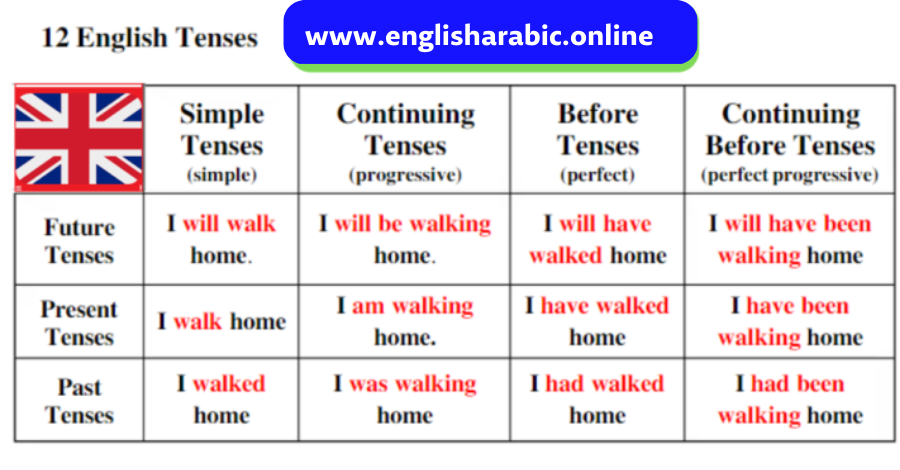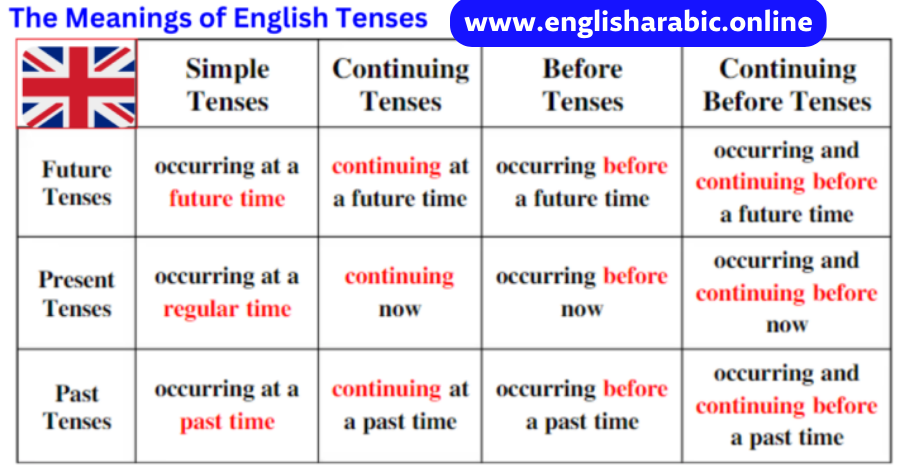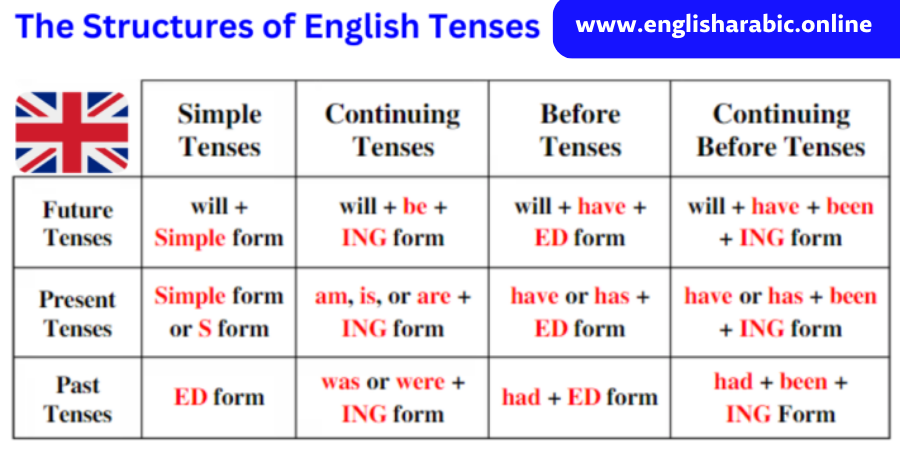
Future Perfect Continuous Tense
Future Perfect Continuous Tense
The English Tense System
The links below are to lessons for each of the 12 basic tenses.
In each lesson we look at two aspects of the tense:
- Structure: How do we make the tense?
- Use: When and why do we use the tense?
Some lessons look at additional aspects, and most of them finish with a quiz to check your understanding.
- Present Tense
- Present Continuous Tense
- Present Perfect Tense
- Present Perfect Continuous Tense
- Past Tense
- Past Continuous Tense
- Past Perfect Tense
- Past Perfect Continuous Tense
- Future Tense
- Future Continuous Tense
- Future Perfect Tense
- Future Perfect Continuous Tense
We use different tenses to describe the time that the verb refers to.



We use the future perfect continuous tense when we discuss things happening for a period of time and ending at a specific time in the future.
Forming Future Perfect Continuous with will:
| Subject | Will | Have | Been | Main Verb (Present
Participle) |
Rest of Sentence |
| I, you, he, she, it, we, they | will | have | been | driving | for ten hours when we finally arrive. |
Forming Future Perfect with going to:
| Subject | Present Tense “To Be” verb | Going To | Have | Been | Main Verb (Past Participle) | Rest of Sentence |
| I | am | going to | have | been | driving | for ten hours when we finally arrive. |
| You, we, they | are | going to | have | been | driving | for ten hours when we finally arrive. |
| He, she, it | is | going to | have | been | driving | for ten hours when we finally arrive. |
There is no difference between “will” and “going to,” although “will” is usually more common.
Note: Stative Verbs
Some verbs, called “stative” or “non-continuous” verbs, can’t be used in continuous tenses. Others can be used in continuous tenses, but their meaning changes. Make sure you understand the difference between stative and non-stative (action) verbs while using future perfect continuous and all continuous tenses. To talk about duration with stative verbs, use future perfect. You can find more information here.
Using the Future Perfect Continuous Tense
A Duration Before a Future Point in Time
Use this tense with action verbs to talk about something that started happening and continued to happen until a specific time in the future. Time clauses beginning with “by,” “by the time,” “when,” and “before” and using verbs in the simple present are often used to express the “specific future time.”
- By the time you arrive, I will have been cooking for seven hours.
- In 2019, I’m going to have been working as a teacher for four years.
- Jeremy and Paula will have been dating long-distance for 5 months when they finally meet face-to-face next week.
- I will have been going to college for six years by the time I finally have enough credits to graduate.
Reasons and Explanations in the Future
This tense is a good way to show cause and effect in the future.
- I can’t go out with you tomorrow night because I will have been working for ten hours and I’ll be too tired.
- The children will be sugar-crazy when the party is over because they are going to have been eating ice cream, cake, and candy all day.
- I will have been studying English intensely for four months in the exchange program when I take the TOEFL, so I’ll be able to get a good score.
Negative Statements
To make negative statements with the future perfect continuous:
add “not” before “going to”
add “not” after “will.” (the most common form is “won’t”)
- I won’t have been working for five years next month.
- Leslie won’t have been sleeping for long, so don’t wake her up when you come home.
- Luke and Mario aren’t going to have been studying, so they won’t do well on the test tomorrow.
Question Forms
Information Questions about the Subject:
To make a question about the subject of a sentence, use a question word as the subject. The form is:
question word + will + have + main verb (past participle) + rest of sentence
question word + “to be” verb + going to + have + main verb (past participle) + rest of sentence
- ???is going to have been watching television tomorrow. –>
- Who is going to have been watching television tomorrow?
- ??? people will have been waiting for the train when it arrives. –>
- How many people will have been waiting for the train when it arrives?
- ???’s sister will have been teaching math for two years in April. –>
- Whose sister will have been teaching math for two years in April?
Questions about the Verb or Words after the Verb:
To make a yes/no question about the verb or words after the verb with the future perfect tense, put either the “will” or the “to be” verb before the subject:
Will + subject + be + main verb (present participle) + rest of sentence
“To be” verb + going to + main verb (present participle) + rest of sentence
- Are you going to have been exercising at 5:00 am tomorrow?
- Will you have been working too much when the guests arrive?
- Will Sally have been traveling when you see her next month?
- Is she going to have been baking when I call her?
To make an open-ended question, put a question word (who, what, where, when, why, how) at the beginning of the sentence.
- Why are you going to have been exercising at 5:00 tomorrow?
- Why will you have been working too much when the guests arrive?
- Where will Sally have been travelling when you see her next month?
- What is she going to have been baking when I call her?
Are you ready to see how well you know the Future Perfect continuous Tense ?
<hr /






